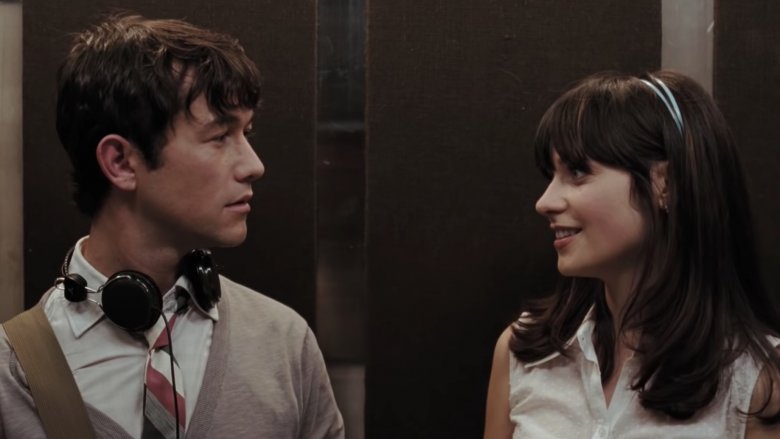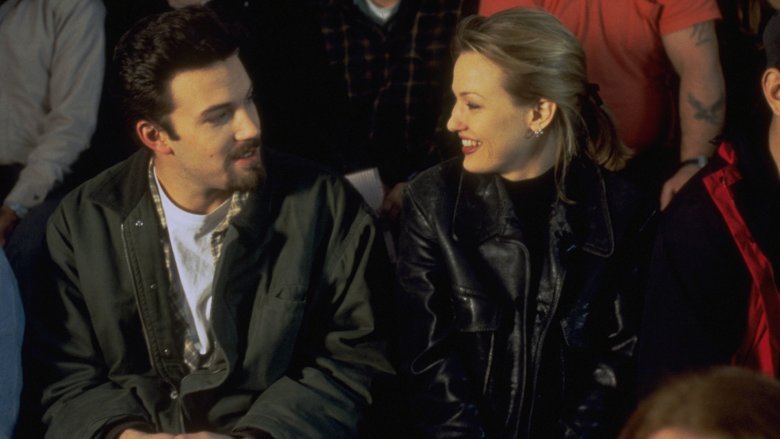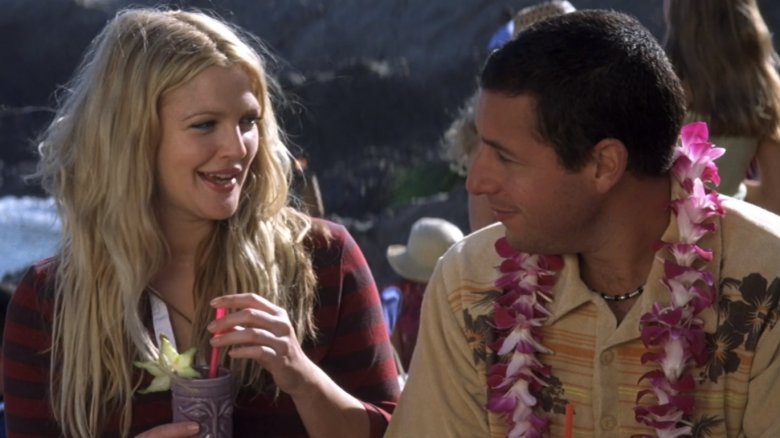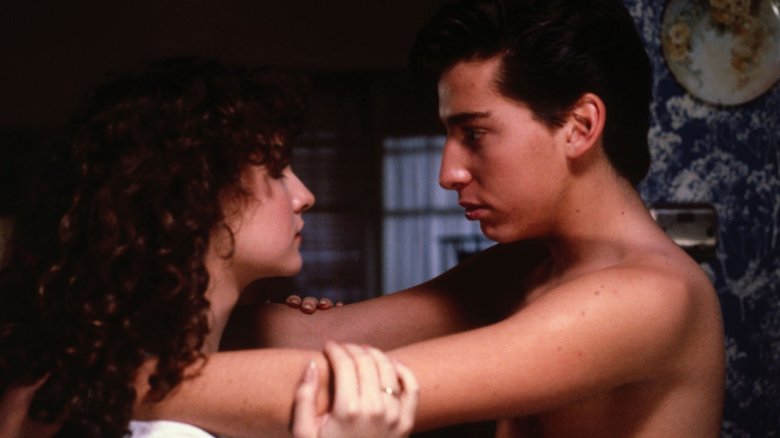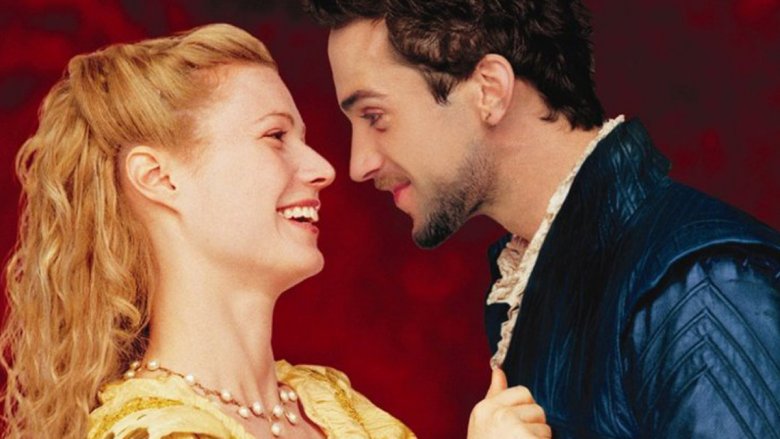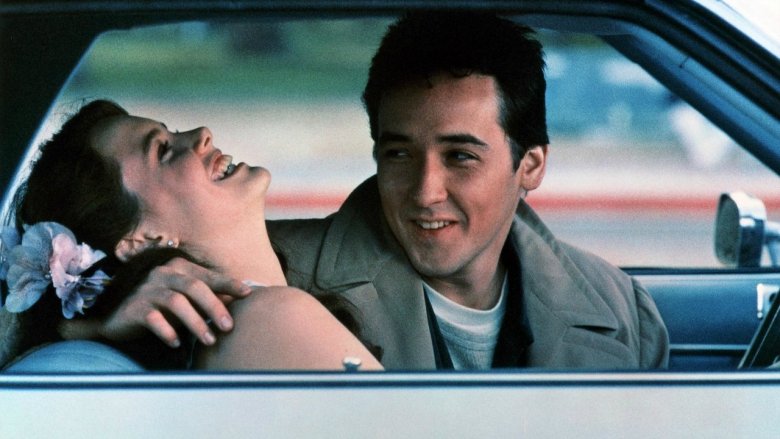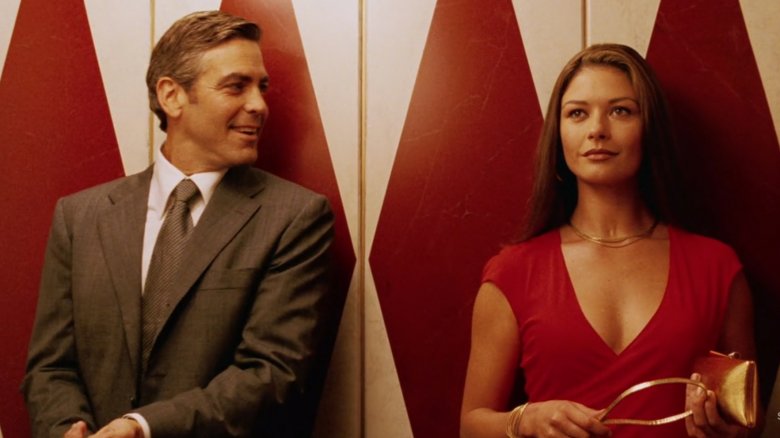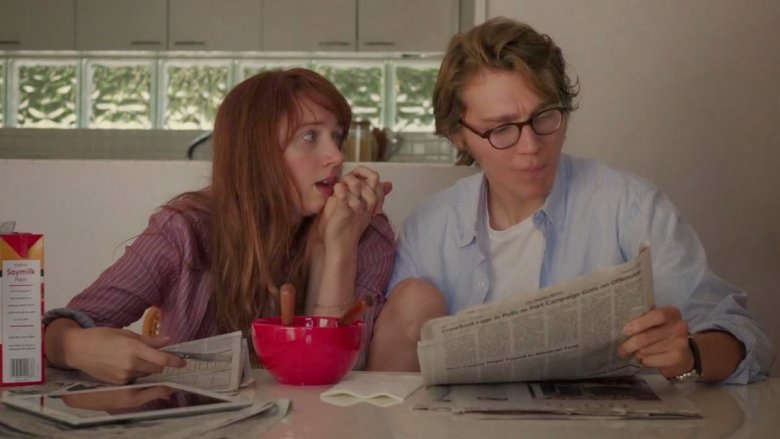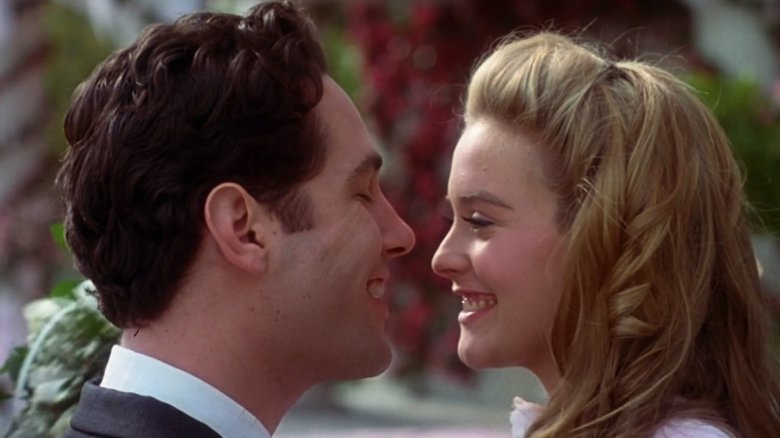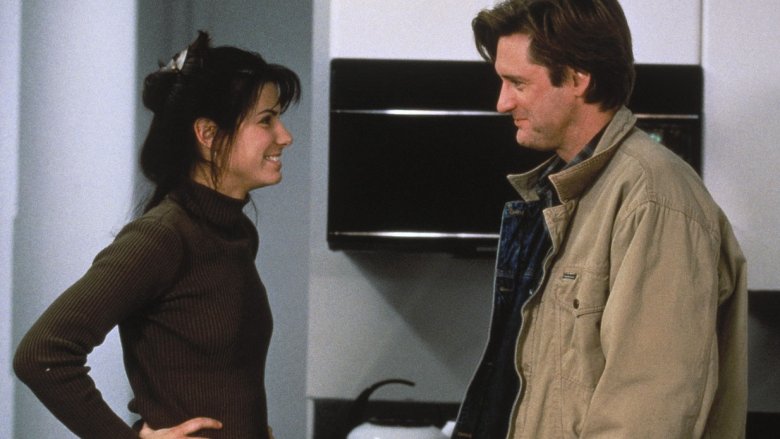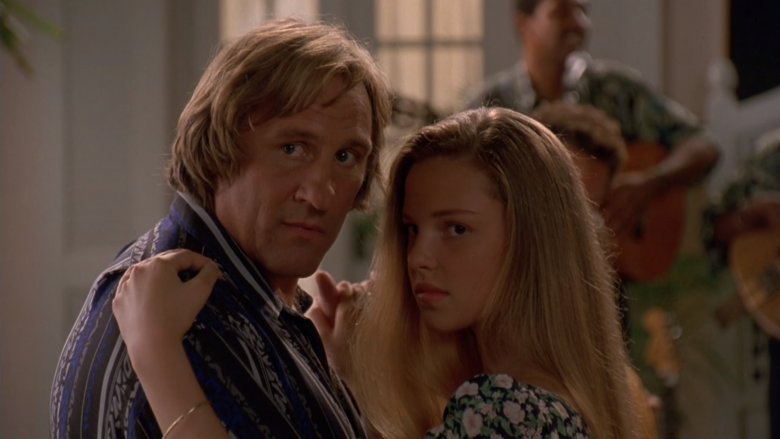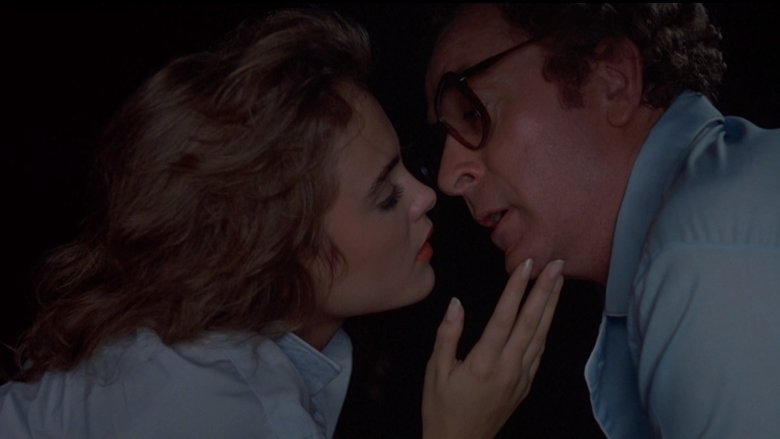Romantic Comedies With Really Messed Up Endings
Romantic comedies are often summarized thusly: "Boy meets girl. Boy loses girl. Boy gets girl." They're thought of as good date movies, light-hearted content that provides laughs and romance, with just a smidge of drama to raise the stakes of the plot. These sorts of films have been around almost as long as film itself, and perhaps that's why the form has more recently veered into darker territory. Some romantic comedies, whether intentionally or not, end up playing on and even subverting audience expectations of the genre — resulting in some surprisingly intense moments you don't see coming. We've looked over the past few decades of romantic comedies and found that some have really messed up endings.
Summer lovin'
The 2009 hipster romance 500 Days of Summer tells us right at the start that "this is not a love story." We see Tom (Joseph Gordon-Levitt), heartbroken and breaking plates over the loss of his sort-of girlfriend Summer (Zooey Deschanel) before we meet the lady herself. 500 Days of Summer shows us the end of Tom and Summer's not-quite relationship before we see it begin. Yet the winsome way in which the events unfold nearly convinces the viewer the relationship might survive.
Early on, Summer tells Tom, "I don't feel comfortable being anyone's girlfriend. I don't feel comfortable being anyone's anything." Romantic comedy rules make this seem like a challenge, that Tom has to melt Summer's resolve with his love. For a while he seems on track to do just that: kisses in the copy room at work, goofing around in record stores. Towards the end of the film, we see Tom's point of view finally strip away the fantasy framing, revealing that those moments weren't what they seemed. The kiss in the copy room never happened, and the goofing around in a record store was Tom trying to lighten the mood when he sensed Summer pulling away.
The look on Tom's face as he comes to these realizations says it all. The audience can't help but be floored along with him upon realizing the level of his self-delusion and the pain it ended up causing both of them. Even Gordon-Levitt agrees: "It's mostly Tom's fault. He's projecting. He's not listening. He's selfish."
How to lose a girl with one sentence
The 1997 film Chasing Amy documents the lives of Banky and Holden, two small-town New Jersey comic artists on the verge of selling out by licensing their characters. Then Holden meets Alyssa, an indie comic artist herself, and the pair begin a friendship. Despite the fact that she's a lesbian, he predictably falls for her, and confesses his feelings to her. Surprisingly, she decides to date him anyway, admitting her sexuality might be more fluid than she'd thought. Holden can't seem to open his mind, however, when Banky uncovers that Alyssa had a reputation for being sexually adventurous in high school. He confronts her about it, "laying a guilt trip" on her in public and having one heck of an argument in the parking lot of a hockey rink.
So what's the solution? What's the grand gesture Holden can make to show Alyssa the depth of his feelings for her, so that these two who are so very much in love with each other might live happily ever after? Most audiences probably didn't guess "propose a threesome involving his homophobic best friend" who recently accused her of being a man-hating lesbian. "We've all gotta have sex together," Holden earnestly argues, so the three of them can "finally be alright." Alyssa tells him she loves him, and always will, but she isn't his "whore." Ouch. In every possible way.
An affair to remember?
In 2004, the romantic comedy dream-team of Drew Barrymore and Adam Sandler reunited for 50 First Dates. Sandler again inhabited the role of a romantic cynic, and Barrymore once again proved she's "the closest thing to sunshine you'll find at the movies." Sandler played Henry, a womanizing veterinarian, to Barrymore's Lucy, who has a form of amnesia that doesn't allow her to create new memories.
Lucy and Henry fall for each other, only for Lucy to forget their relationship with each new morning. Henry leaves his old lifestyle behind to dedicate his life to trying to remind Lucy of their love. She eventually pushes him to stop obsessing over their courtship and pursue his dream of studying sea life in Alaska. He can't stay away, of course, and discovers that even when Lucy doesn't remember who he is, she dreams about him "almost every night" and paints him just as often. The film ends with Lucy waking up on Henry's boat and watching a tape he's made for her with scenes from their wedding. She comes above deck to find her father, Henry, and their young daughter, whom Henry left off of the tape for some reason.
The film's entire premise is on shaky ground. Henry's stalkerish behavior in contriving increasingly strange scenarios that allow him to keep "running into" Lucy is questionable. As one reviewer asked, "what if Drew Barrymore doesn't want to be made to fall in love with Adam Sandler every day?" There's one actual happy ending linked to this film, however. It seems the idea of showing dementia patients a daily video that was made by their actual loved ones (not strangers trying to romance them) was a good one. It's been used by a care home in New York as part of a treatment for memory loss.
She's my best friend's girl
The conceit of a group of randy teenage boys desperate to lose their virginity is well-known to Hollywood. So much so, there are Top 20 lists written about the finest examples of the form. One of the earlier examples is found in the 1982 film The Last American Virgin, in which three high school boys work hard to improve their sex lives. Rick has the most game of the crew, and one of his partners is Diane, the object of his friend Gary's affection. Gary unsuccessfully pushes forward in his quest, and the sort of hijinx you'd expect in this sort of film ensue.
One day he stumbles upon Diane crying after a fight with Rick, and discovers that he has gotten her pregnant and shunned her. Gary decides to prove his worth to Diane by helping her afford to terminate the pregnancy. The pair bond awkwardly over the tragic situation, and play house together as Diane recovers. They share a kiss after Gary confesses his love for her. Emboldened by this, Gary bounces off to Diane's birthday party thinking they're a couple, only to discover her kissing Rick instead. Gary's shock and pain is met with sad, embarrassed sympathy from Diane and a knowing, but not unkind, stare from Rick. The film ends with Gary driving through the night, tears running down his face. It's "an absolute gut punch of an ending," as Birth.Movies.Death. explained, calling it "certainly the biggest (intentional) downer of any teen movie from that decade."
Parting is such sweet sorrow
Will Shakespeare can't write. When we meet the bard in the 1998 film Shakespeare in Love, he's in a creative rut. Enter Viola, a young woman from a wealthy merchant family. She is a dutiful daughter, but secretly longs for the theater and dresses as a man to try out for a part in Will's new play. Will's powers of observation leave a bit to be desired, but he soon discovers her true identity and falls in love with her.
Throwing caution to the wind, they begin a love affair which inspires Will to write Romeo and Juliet. The match is certainly star-crossed — Will has an estranged wife and children in the country, and Viola is betrothed to the nasty Lord Wessex. Still, there's got to be a way out of this, right? Not much is known about this period of Shakespeare's life in London, or about his love life in general, so there's surely there's room to conjure us a happy ending?
When Queen Elizabeth I stands and addresses the first audience of Romeo and Juliet at the film's end, it seems a ripe moment for a deus ex machina, but it's not to be. The Queen "may know something of a woman in a man's profession," she tells the crowd, but she also knows about duty. So it can only end "as stories must when love is denied," she explains to Wessex, "with tears, and a journey." So it is that Will and Viola are parted. She's sent to a distant land with an angry husband, and he's reunited with his quill to pen Twelfth Night in her memory.
It's the end of the world as we know it
"It's not the end of the world" is usually a phrase of consolation. Seeking a Friend for the End of the World doesn't have that luxury, as the world is, in fact, ending. An asteroid is heading straight for Earth, set to arrive in three weeks. Dodge (Steve Carell) is an insurance salesman whose wife has abandoned him. Penny (Keira Knightley) is his neighbor who is desperate to reunite with her parents in England. They begin an odd road trip together, trying to get Penny to a pilot who can fly her to the UK, while Dodge tries to track down an old flame.
Along the way, they encounter people dealing with the end of the world in a variety of odd ways, many of which include orgiastic parties fueled by drugs and dancing. Dodge's quest for his high school sweetheart fizzles, and he declares to Penny that he's fallen in love with her instead. Penny still makes it on a plane home to her family, only to turn around and head back upon realizing her feelings for Dodge. "I wish I'd met you a long time ago, when we were kids," she tells him.
"It couldn't have happened any other way," he replies. "It had to happen now." And then it happens: the booming starts, and the screen turns black.
One reviewer aptly called this "a real doozy of a scene," one where you can't help but agree with Penny's hopes that somehow they'd "save each other" and avoid the end. Writer and director Lorene Scafaria sees a link between love and death. Speaking about the film, she said, "That's what love is, that commitment. That really is who you want to be lying next to when the lights go out."
Say anything, but not if the FBI is listening
"I gave her my heart and she gave me a pen," Lloyd Dobbler (John Cusack) tells his sister in the 1989 teen classic Say Anything. He's broken up over his Valedictorian valentine, Diane (Ione Skye), who has left him on the advice of her gruff but well-meaning father, Jim (John Mahoney). Can we really blame a dad for being worried about the prospects of a guy whose aspirations are to go pro in kickboxing without being sure he's any good at it? At any rate, it's during this period of estrangement that Lloyd hoists the famous boombox over his head to play "In Your Eyes" by Peter Gabriel.
Diane's struggle against her feelings for Lloyd is only part of the story. We also discover that her father has been leading a double life. In addition to being overprotective, it's revealed that Jim has been embezzling tens of thousands of dollars from the estates of the elderly residents of the rest home he owns.
Diane is disillusioned, and Jim ends up in prison. "If the father tries to stand in for a boyfriend by giving his daughter a ring at the beginning at the movie," one critic wrote, "she closes that circle by handing him the breakup pen at the picture's end." Diane is only 18 years old, and flying to a strange country for the first time. She's got no support system other than a directionless, if sweet, teenage boy she just met a few weeks ago. What effect will her father being in prison ultimately have on her? It's a heavy load to tack onto a summer romance.
Boy meets girl, boy marries girl, boy calls hit man?
The 2003 Coen Brothers film Intolerable Cruelty "updates the screwball comedies of the '30s and '40s for a crasser, more litigious age," according to The A.V. Club. George Clooney stars as Miles Massey, an unscrupulous divorce lawyer who has perfected a prenuptial agreement that is allegedly unbreakable. Enter Catherine Zeta-Jones as Marylin, a "professional divorcee" whose soon-to-be-former husband Massey represents. To win the case, Massey romances Marilyn and manages to obtain proof of her dishonorable intentions. Left with nothing, Marilyn vows revenge on Massey, and tricks him into thinking she has re-married and successfully divorced an oil tycoon. This lures Massey into marrying her without a prenup in hopes of divorcing away part of her fortune.
The plot thickens when Massey discovers the oil fortune is actually a sham, and now his own wealth is at risk if Marilyn does what she does best: divorce. What's the next logical step? Hire a hit man to murder her, of course. He doesn't want her to suffer, though, in case you were worried.
It's soon revealed that one of Marilyn's previous husbands has died without changing his will, so Marilyn is suddenly actually wealthy and no longer a risk to Miles' bank account. They reconcile, which is somehow more upsetting given the recent murder plot. It's a parody, sure, but as Roger Ebert said in his review, "We enjoy many turns of the screw in this movie, but there comes a time when the screw is seated and they keep turning until they strip the groove."
Get out of my dreams and into my kitchen
Love makes you do crazy things, and so does writer's block. Calvin Weir-Fields (Paul Dano) is struggling to write a novel in the 2012 romantic comedy Ruby Sparks. Zoe Kazan (who also wrote the film) co-stars as the titular Ruby, who Calvin ends up writing into his work as his vision of the perfect woman. He does this a little too well, literally writing her into his existence. She appears in his kitchen one day and the pair begin dating. It's a surreal comic turn inspired by the myth of Pygmalion, where a sculptor falls in love with his statue.
Unlike that myth, Ruby Sparks takes the idea to its dark, if logical, conclusion: how can one truly have respect for a person who only exists because of their own desires? It's not long before Calvin starts re-writing Ruby and their relationship begins to struggle. The results are a disaster. She clings to him, quite literally, when he writes that she is miserable without him. Feeling guilty, he re-writes her to be full of joy, which is awkward and off-putting as a constant state of being. The pair break up after a truly creepy scene where Calvin proves to Ruby that she is under his control by making her dance.
Calvin writes her freedom from him, and she disappears from his life. Calvin moves on, but later runs into a version of Ruby who has no memory of him. The ending is ambiguous, and implies that the pair might actually have a second chance. It's certainly not meant to be taken literally, because the implications are insane — how would Ruby's friends react to a man they remember and she doesn't, for instance? Even setting those concerns aside, the symbolism of how Calvin "gets to imagine his cake and eat it too," as one reviewer put it, has a nasty edge.
Brotherly love
There's no arguing that Clueless is one of the quintessential films of the 1990s. Written and directed by Amy Heckerling and loosely based on Jane Austen's novel Emma, Clueless made stars out of Alicia Silverstone, Brittany Murphy, and Paul Rudd, among others. The lighthearted comedy depicts the ups and downs of the wealthy teens of Beverly Hill, bursting onto screens in 1995 as a surprise box office hit.
Silverstone stars as Cher, the popular and rich daughter of wealthy lawyer Mel Horowitz (Dan Hedaya), whose mother passed away, leading her father to briefly remarry. His second wife has since moved on, but her son Josh (Rudd) remains a semi-constant figure in their lives. As in the Austen novel, Cher can't resist meddling in the love lives of others. She sets up teachers and friends, but is herself unlucky in love. That is, until she realizes she's been in love with her ex-stepbrother Josh all along, and the two share a movie-ending kiss.
The chemistry between Silverstone and Rudd is almost enough to make you forget the oddness of this pairing. Sure, they aren't really related by blood, but as Mel says at the start of the film, "You divorce wives, not children." It's an odd moment of not-quite-incest that threw audiences. It is a part of Austen's novel, as Emma falls for a man who was once a father-figure to her. The romance didn't seem strange to Heckerling, as it happened in her own family: her grandfather and grandmother met as step-siblings when they were teenagers.
While I was creepin'
Sandra Bullock's big break came with the 1994 action film Speed, but it was the 1995 romantic comedy While You Were Sleeping that cemented her status as a quirky leading lady. Bullock stars as Lucy, a socially awkward token booth clerk in Chicago who develops a crush on a handsome customer (Peter Gallagher) and rescues him from being hit by a train. She travels to the hospital with the man, who ends up in a coma, and whispers: "I was going to marry him." This causes the staff to mistake her for his fiance. She soon discovers the mix-up when the man's family arrives in a panic. She learns his name is Peter, and hasn't the strength to correct the assumption that she's engaged to their unconscious son.
Desperate for human connection and basking in the warm embrace of Peter's family, she continues the ruse and gets to know his brother Jack (Bill Pullman). They fall for each other, but can't admit their feelings, especially when Peter awakens and his family insists he marry Lucy on the spot. Lucy agrees, only to confess at the altar that she actually loves Jack and is sorry for her deception.
This being a romantic comedy, the family doesn't take this as a sign that they've narrowly avoided adding a stalker to their ranks. They're not angry that this stranger lied to them while they were at the bedside of their comatose son. Instead, they all accompany Jack to Lucy's token booth, where he proposes. Take away the winning couple of Bullock and Pullman, and you're left with an undeniably creepy story with a title to match. While You Were Sleeping could just as easily be a horror title, if it used the right font.
Daddy's issues
A good father would do anything for his kids. That concept takes a strange turn in the 1994 film My Father the Hero, starring Gérard Depardieu as Andre, a divorced father seeking to bond with his estranged daughter Nikki (Katherine Heigl) on summer beach vacation. Nikki is 14, and her father has been absent long enough that the last time he saw her, she was still a child. On their vacation, Nikki meets a local named Ben, who is 17 and gorgeous. She's smitten, but concerned she's too young for him. In a fit of panic, she tells him she's 18 and claims that her father is actually her "lover" as proof.
Blissfully unaware of this stunt, Andre is pleased at all the attention his previously sulky daughter begins to lavish on him as she plays up the fake relationship. This is noticed by the other guests at the resort, who are increasingly disgusted at the situation, believing Andre is a pedophile. The proceedings reach a fever pitch when Andre launches into a jaunty rendition of "Thank Heaven for Little Girls" when asked to perform a French song. Andre soon uncovers Nikki's game, and is only briefly angry with her before agreeing to go along with it. "What a plot!" exclaimed Heigl in a recent interview with Howard Stern. Andre even ends up feeding his daughter lines to help make up with Ben, after he discovers the truth and wants nothing to do with her. It's an odd ending to an even odder film.
What happens in Rio stays in Rio
Fathers behaving badly seems to be an appealing concept for filmmakers, and certainly that was the intended theme of the 1984 film Blame it on Rio, which Yahoo called "the most inappropriate romantic comedy of all time." It stars Michael Caine as Matthew, the mid-forties father of 17-year-old Nikki, played by Demi Moore. Matthew's marriage is in trouble, and his wife Karen has bailed on their planned family vacation. This leaves only Matthew's friend Victor (Joseph Bologna) and Victor's 17-year-old daughter Jennifer (Michelle Johnson) to accompany them to Rio. While there, Jennifer confesses to Nikki that she's always had a crush on "Uncle Matthew."
The atmosphere of Rio leads the girls to do things like go topless on the beach. Jennifer increasingly flirts with Matthew, and they end up having sex. Jennifer's crush quickly becomes an obsession, but Matthew continues to sleep with her behind Victor's back. Matthew finally ends things when his wife Karen finds out about the affair and travels to Rio to confront him. Heartbroken, Jennifer ends up attempting suicide, but survives, as she overdosed using birth control pills.
While she's recovering, Karen yells at Jennifer for being selfish as she's laying in a hospital bed with her stomach freshly pumped. Karen and Matthew end up reconciling, and Jennifer quickly meets a new 21-year-old local with whom her father allows her to stay in Rio, unchaperoned. Seems like a good idea, right? What could possibly go wrong? Roger Ebert said that the movie had "the brain of a 1940s bongo comedy and the heart of a porno film. It's really unsettling to see how casually this movie takes a serious situation."

